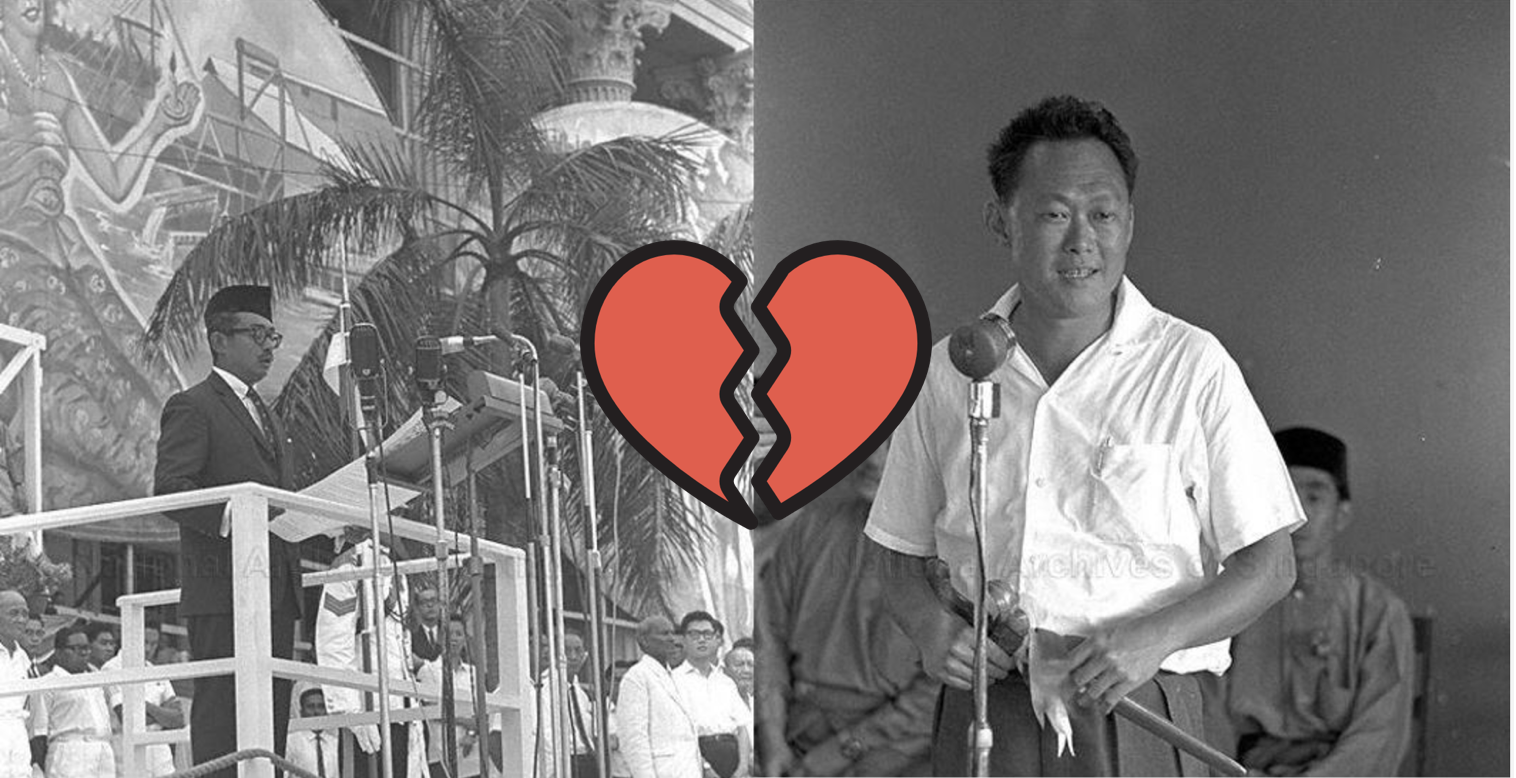If Singapore was still part of Malaysia, we would be celebrating Hari Merdeka (Malay for 'Independence Day') on Aug. 31 every year. The day marks the old Federation of Malaya's (before it became Malaysia) independence from the British in 1957.
Singapore was once part of the Federation of Malaysia from 1963 to 1965. These two years were a time of political friction between Singapore led by then prime minister was Lee Kuan Yew (LKY), and Malaysia led by their first prime minister Tunku Abdul Rahman.
In the 1980s, Tunku Abdul Rahman, who was no longer in office, spoke candidly in an interview by Abdullah Ahmad, a long-time aide and political secretary to Tun Abdul Razak Hussain - the Tunku's successor and Malaysia's second PM.
[caption id="" align="aligncenter" width="310"] Tunku Abdul Rahman. Source: Wikipedia[/caption]
Tunku Abdul Rahman. Source: Wikipedia[/caption]
The interview saw the Tunku revealing some of his sentiments regarding Singapore's merger and separation with Malaysia. He also shared his views on LKY.
An edited excerpt of the interview was published by Esquire.sg earlier this month (Aug. 7).
We've extracted some juicy bits from the interview below for you.
[related_story]
Singapore was not in the Tunku's initial plan for Malaysia
Tunku Abdul Rahman revealed in the interview that he had only wanted Sabah and Sarawak for Malaysia, but the British made it a condition for him to take in Singapore as well.
In layman terms, the idea of merger was like a fried chicken meal.
Imagine ordering fried chicken, but the restaurant tells you that it has to come as a set with coleslaw. So, it's either fried chicken with coleslaw, or no fried chicken at all. Singapore was the coleslaw, and Tunku really just wanted fried chicken.
Dato’ Abdullah Ahmad: You wanted Singapore in Malaysia. I think, to me, it was a smart move on your part.
The Tunku: In actual fact, I wanted only Sarawak and North Borneo (now Sabah) at the time. But the British made a condition that if I wanted Sarawak and North Borneo, I must also have Singapore as well, because we would be the influence that could keep Singapore from the communist menace. I said that that was all right; if that was their condition, I would take Singapore in.
Dato’ Abdullah Ahmad: So your speech about your fear of Singapore becoming a Southeast Asian “Cuba” was merely an excuse, wasn’t it?
The Tunku: Yes.
LKY had wanted PAP and the Tunku's alliance to form a coalition government
The Tunku was not in favour of it though.
Dato’ Abdullah Ahmad: Did Douglas-Home or any member of his Cabinet, Duncan Sandys or Thorneycroft (Peter Thorneycroft, British Secretary of Defence), try to persuade you, either following appeals from Singapore, merely acting on their own, or as a result of Singapore British lobbying in London, to take Lee Kuan Yew into the central government—to put him under your wing?
The Tunku: Nothing like that. The British, say what you like about them, are very correct people. What actually happened was that Lee Kuan Yew and his colleagues themselves made this request to me. It had nothing to do with the British. The trouble came about when Lee Kuan Yew asked me if we and the PAP could form a national coalition government so that we could jointly tackle the racial problems. I refused because there was no point; we (the Alliance Party) were strong, with more than enough majority in parliament. Lee Kuan Yew seemed to have forgotten that the Alliance itself was a coalition. I didn’t want to enlarge the coalition because there was no need to do so.
The Tunku also saw LKY as "an impatient man in a great hurry to be the leader of Malaysia".
The rumours that LKY would be arrested when Singapore was part of Malaysia was not true
When LKY campaigned for a "Malaysian Malaysia", Malay extremists clamoured publicly for his arrest and there were rumours that he would be detained.
The Tunku however, denied any intention of arrest in the interview:
"I never wanted to arrest him. I mentioned in my column (in The Star newspaper) and speeches that if I wanted to arrest him, nothing would save him."
The Tunku was unhappy with LKY calling himself prime minister during merger
He made this point at different points in the interview.
"He wanted to continue calling himself Prime Minister Lee Kuan Yew. There just cannot be two Prime Ministers in one nation. That was why I said he could not join the coalition."
"Instead, I gave him independence when he wanted so much to be called Prime Minister. You know fully well no one country can have two Prime Ministers. But I allowed it for two years because I never intended to keep Singapore anyway."
On deciding to have Singapore separated from Malaysia
In the end, Singapore was evicted from Malaysia because of fundamental political disagreements.
Dato’ Abdullah Ahmad: Why did you not entertain Lee Kuan Yew’s plea for a looser federation instead of separation?
The Tunku: If I had agreed to what he wanted, he would be a good boy for a while. Then he would go back to his old ways of trying to create ill will between the Malays and the Chinese through the Malaysian Malaysia campaign. I thought for a long time, you know, and I was in close touch with Razak, that the best way was to go on our separate ways but remain good friends. I simply could no longer work with nor trust Lee Kuan Yew.
The Tunku had neutral sentiments towards LKY and Singapore
Despite his previous discontent with Singapore and LKY in the 1960s, the Tunku, who resigned from the premiership in 1970, was feeling more neutral towards Singapore at the time of the interview in the early 1980s:
"I think Singapore is working all right now. We say nothing against Kuan Yew, and Kuan Yew says nothing about us."
Here are some totally unrelated but equally interesting stories:
Quiz: What kind of Singaporean will you be in a crisis?
Big shot bosses share the real reasons why they would hire someone
Top photo composite image from NAS and Shareicon.
[related_story]
If you like what you read, follow us on Facebook, Instagram, Twitter and Telegram to get the latest updates.


